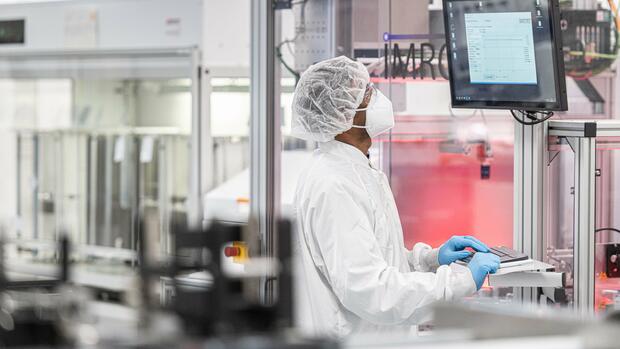The solar start-up is currently planning its first commercial production in Bitterfeld.
(Photo: Nexwafe)
Dusseldorf The Freiburg solar start-up Nexwafe has collected 30 million euros in its latest round of financing. In order for the construction of the announced solar factory in Bitterfeld to proceed, a second and much larger round is to follow in the second half of the year. The company has raised a total of 100 million euros so far.
Financially strong names such as the solar company Reliance New Energy of the Indian billionaire Mukesh Ambani or the investment fund of the Saudi Arabian oil giant Saudi Aramco are again among the investors. The German entrepreneurial family Strüngmann is also involved again through their investment company Athos.
Nexwafe has attracted many influential prospects since its inception in 2015. With its innovative process, the solar technology manufacturer promises a significantly cheaper and resource-saving production of silicon wafers. These thin discs form the basis for generating electricity from solar energy. It is in them that the photoelectric effect takes place, with which the conversion of solar energy into electricity is made possible in the first place.
Nexwafe: Process should significantly reduce costs
Their share of the added value of each individual solar module is correspondingly large. The wafers account for 15 percent of the costs. The polysilicon required for this accounts for another 14 percent. The rising raw material prices for polysilicon alone drove up the price of photovoltaic systems by up to twenty percent last year. Even though prices have since fallen again, experts say that Nexwafe is not as badly affected as other wafer manufacturers.
For its process, the company buys silicon in raw form and not as further processed polysilicon. That saves costs. However, producing wafers is complex, energy-intensive and therefore relatively expensive, also because a large part of the silicon is usually lost when the disk-shaped wafers are cut. This step is now completely eliminated with Nexwafe’s specially developed process.
The thin plates account for 15 percent of the cost of solar panels.
(Photo: Nexwafe)
The Freiburg-based company promises significantly cheaper and resource-saving wafers. The start-up wants to reduce production costs by up to 30 percent and CO2 emissions by 70 percent. The process was co-developed at the Fraunhofer Institute for Solar Energy Systems (ISE), including ISE boss Andreas Bett and Nexwafe co-founder Stefan Reber.
>> Read also: Bucking the trend – climate start-ups collect record sums
Reber was the head of the company, which was founded in 2015, for a long time, but handed over the management to the Indian Davor Sutija in 2020: “The funds now received will be used to lay the foundation for the first commercial plant for the production of more efficient, cheaper and green solar wafers for photovoltaic manufacturers around the world,” Sutija said of the latest round of financing.
In Bitterfeld-Wolfen, Nexwafe wants to set up its first commercial plant for wafer production. In the first stage of expansion, production will have a capacity of 250 megawatts, which can be increased to up to three gigawatts. Production is scheduled to start in the first half of 2025. In addition to the start of ground work, the fresh capital is also intended to be used to order equipment for the technical infrastructure – here the delivery times are sometimes very long.
But a production plant is not only being built in Bitterfeld – Nexwafe is also working with the world’s largest oil company on its own factory in Saudi Arabia. For this, Saudi Aramco Energy Ventures gets a stake in Nexwafe. The start-up did not want to reveal how high this would be. Wafer production is also to be set up in India in cooperation with Reliance.
Solar Valley in Saxony-Anhalt
For its plans, Nexwafe needs significantly more than the funds collected so far. In the second half of the year, the wafer manufacturer wants to reach a “low three-digit million amount” including the 30 million euros collected so far.
The company is in good company with the construction of its wafer factory in Bitterfeld. The solar module manufacturer Meyer Burger has set up its factory in neighboring Thalheim. The region was once called “Solar Valley” at the time of the now failed pioneer Solarworld.
Most of the parts for the solar industry still come from China. But that could change, at least in part. Federal Minister of Economics Robert Habeck (Greens) wants to massively promote the development of industrial production capacities for the energy transition, including for the solar industry.
More: Battle for craftsmen: Electricity supplier Lichtblick buys specialist platform
